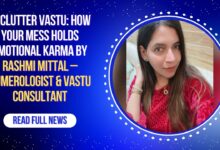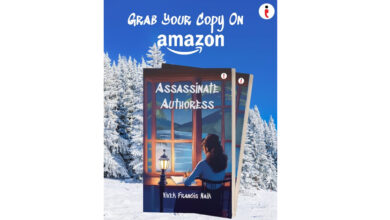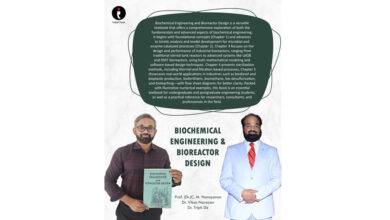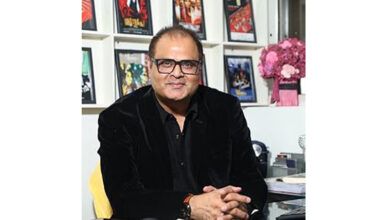Exclusive Interview with Literary Sensation KASTURI SINHA

Kasturi Sinha from Bhubaneswar, Odisha is a PhD scholar, a celebrated poet and a literary force whose writing spans over decades and forms a rich trajectory of human emotion and experience. She is a compelling voice in contemporary literature, known for her evocative poetry and introspective prose. With a style that blends emotional depth, social insight, and lyrical precision, her work resonates across genres and forms.Renowned for her profound explorations of life’s most intimate emotions, she has garnered global recognition and numerous awards throughout her illustrious career. Her books, loved by readers worldwide, are a testament to her ability to capture the intricacies of joy, sorrow, love, and loss with remarkable depth and clarity. A prolific poet with more than 5,000 poems to her name, she has explored a vast array of poetic forms, from lyrics and odes to elegies and sonnets. Whether through haiku, epic verse, or personal essays, Kasturi explores themes of love, identity, and the intricate truths of human experience. Her writing invites readers to pause, reflect, and find beauty in both the spoken and the unsaid.
What inspired you to start writing poetry?
I was inspired by the power of language to convey deep emotions and complex thoughts in a compact form. Poetry is a form of expressing more in less.It consumes less time. I have a creative mind hence for me, it is subtle to construct any form of poetry. Poetry allows for a heightened sense of economy and precision, where every word counts and carries weight. In this form, the rhythm, sound, and imagery can evoke deeper emotions, often transcending the limitations of more straightforward prose.Poetry can capture a feeling, or an idea in a way that resonates on multiple levels, engaging both intellect and emotion. It often invites interpretation and introspection, creating space for the reader to find their own meaning in the work. Additionally, poetry allows for greater creative freedom with structure, form, and language, which can be a liberating experience for the writer.
How do you balance structure and freedom in your poetry?
Balancing structure and freedom in poetry is a delicate switch, where both elements support and enhance each other. For me, structure often serves as a foundation whether it’s the rigid form of a sonnet, the simplicity of haiku, or a free verse line. It offers a sense of discipline, providing limits within which creativity can unfold.
At the same time, freedom is essential. It allows for spontaneity, emotion, and expression to flow without constraints. In my work, I sometimes start with a structure to guide the poem but leave room for deviation. For example, in my haiku, I stick to the 5-7-5 syllable rule, but I let the content of the poem breathe freely within those boundaries.The trick is in knowing when the structure is providing clarity or rhythm, and when it’s stifling the message or emotion. When that balance feels right, the result often seems organic, like the structure and freedom were meant to exist together.
How do you know when a poem is finished?
Do you edit a lot, or is your first draft close to your final version?
A poem is finished when it stops asking questions and starts answering them, you can say, when the tension between silence and sound feels resolved, even if the message remains open-ended. Sometimes, it’s a feeling, like a door gently closing behind you. Other times, it’s the realization that changing another word would dilute the essence rather than refine it.
As for editing, I believe in both lightning and labor. Some poems arrive nearly whole, like they’ve been waiting patiently to be written down. Others demand excavation like cutting, shifting, reimagining lines until they breathe with the rhythm and truth I am chasing. First drafts hold the raw fire; revision shapes the flame.So, I don’t wait for perfection. I wait for peace. When the poem stops tugging at me, when I can read it aloud and feel no urge to add or subtract—that’s when I let it go.
Do you follow a writing routine or wait for inspiration?
I follow a writing routine. Inspiration is wonderful when it strikes, but I’ve found that discipline turns writing into a habit rather than a hope. I show up consistently, whether I feel ready or not, and often, inspiration meets me halfway. Routine keeps the words flowing even on days when creativity feels distant.
Your journey as a poet began in a small room surrounded by books. What advice would you give to aspiring writers who may not have the same resources or support?
My journey as a poet began in a small room surrounded by books but it wasn’t the books alone that lit the spark. It was the silence, the hunger to understand the world, and the need to make sense of myself. Aspiring writers who may not have shelves of books or circles of support, know this: poetry begins with attention. Pay attention to your thoughts, your surroundings, the way light falls on your hands, the way your heart reacts to silence.
You don’t need much to start, just something to write with and something to write about. Read what you can, listen closely to the world, and trust that your voice matters, even if no one is listening yet. Write like your truth is worth being told because it is. And when it gets hard (and it will), remember: the absence of support can be its own kind of fuel. Let it push you deeper into your voice, not away from it. Just remember, the most powerful poems often grow in the quietest soil.
Your work seamlessly blends traditional and postmodern styles. Can you share your inspirations and creative process?
Thank you for this thoughtful question. My work lives at the intersection of tradition and rebellion, where I often find myself walking a tightrope between the lyricism of the past and the fragmented urgency of the present. I draw deeply from classical forms; the cadence of ancient chants, the inward gaze of mystic poetry, the precision of haiku but I also welcome the raw dissonance of postmodernism, where silence can be as loud as sound.
My inspirations are often moments rather than monuments; a glance, a goodbye, a protest, a poem overheard in the wind. I write to remember and to forget. My process is instinctive, meditative, and at times disorienting. A single line might haunt me for weeks until it finds the right place to rest. I let my poems arrive as they wish.
To me, poetry is not just a craft; it’s a way of existing between what was and what could be.
What’s the common theme of your poetry?
I write poems that breathe with the pulse of being human. My verses reach into the depths of love and the fragility of relationships, the glimmer of hope and the quiet strength of light. I explore the weight of memory, the ache of loss, and the relentless passage of time. Through every line, I confront what it means to live fully, vulnerably, and consciously in a world shaped by society’s gaze. Whether it is identity questioned or resilience found, I try to distill the beauty, the pain, and the silent truths that define the human journey. Poetry, for me, is not just art…it is how I make sense of everything we carry.
What’s your favourite genre to explore?
Lately, I’ve found myself drawn more and more towards drama. There’s something deeply compelling about capturing the everyday…the quiet moments, the small tensions, the subtle shifts in character. I love building lives on the page, layering in minute details that make people feel real. Though it’s a genre I’ve only recently started exploring more seriously, it’s quickly becoming a favorite. My current book, which is almost complete, has only deepened that connection.
What’s next for you? Are you working on any new projects? Any upcoming publications?
Dear Readers,
Two deeply cherished projects are blossoming into reality, and I can’t wait to share them with you. Garland of Verses: Love, Life, Light is a soulwoven collection of quotes and poetry, adorned with delicate illustrations that breathe life into every line. It is a celebration of tenderness, resilience, and the radiant moments in between.Alongside it, Seventeen Steps to Truth…my intimate offering of haiku poetry which captures the fleeting truths of existence in just seventeen syllables. Both titles will soon be available online, ready for you to explore, reflect, and keep close to heart.
As many of you know, I began as a scriptwriter but now, I find myself passionately immersed in the world of drama. This new journey is one of exploration and intensity, where emotions are not just written but performed. It’s a challenging shift, but one that feels deeply right and I’m embracing it with all my creative fire.
Any advice or suggestions for new writers?
To new writers: write with honesty, not perfection. Let your words be wild before they are wise. Don’t wait for the perfect sentence rather begin with the imperfect truth. Read as much as you write, and listen to silence as much as sound. Your voice will find you as you keep returning to the page. Be patient. Be brave. And above all, protect your love for writing as it is the one thing that will carry you through doubt.
Your story is an inspiration to many. What message would you like to convey to your readers and fans about the power of perseverance and creativity?
Perseverance and creativity are not just traits—they’re lifelines. When the world goes silent on your dreams or throws detours in your path, it’s your quiet persistence and your bold imagination that keep you moving. Creativity lets you rewrite the narrative when life doesn’t go as planned. And perseverance? It’s the voice that says, “try again” when everything else says “give up.” Trust that your story matters.Creativity is the rebellion that keeps us alive. It’s how we turn our wounds into wisdom, our chaos into meaning. It doesn’t always arrive with fanfare. Sometimes it whispers, nudges, scribbles, breaks rules. But in the end, it liberates us, helps us see beauty in the broken places and creates future we’ve only dared to imagine.
What message do you want to share with your readers?
Even the fractured pieces of our stories form something whole. So, don’t lose hope and keep writing.Remember, you are not alone in your hurt, nor in your healing.There is beauty in surviving and so let’s appreciate it. I write to remember, to forget, and sometimes, just to feel.Stories don’t always have neat endings. That’s how you know they’re real.Some truths need seventeen syllables. Some need a whole lifetime. So, readers grab a copy of Seventeen Steps to Truth by your own Kasturi Sinha and know how life is.








